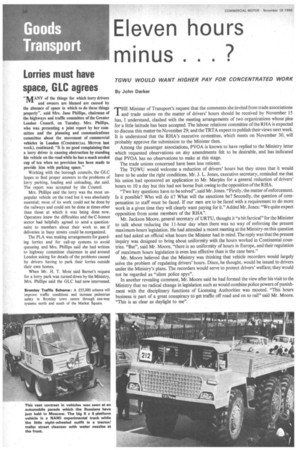Eleven hours minus . . . ?
Page 38

If you've noticed an error in this article please click here to report it so we can fix it.
TGWU WOULD WANT HIGHER PAY FOR CONCENTRATED WORK By John Darker
THE Minister of Transport's request that the comments she invited from trade associations and trade unions on the matter of drivers' hours should be received by November 15 has, I understand, clashed with the meeting arrangements of two organizations whose plea for a little latitude has been accepted. The labour relations committee of the RHA is expected to discuss this matter on November 29; and the TRTA expect to publish their views next week. It is understood that the RHA's executive committee, which meets on November 30, will probably approve the submission to the Minister then.
Among the passenger associations, PVOA is known to have replied to the Ministry letter which requested observations on gny amendments felt to be desirable, and has indicated that PVOA has no observations to make at this stage.
The trade unions concerned have been less reticent.
The TGWU would welcome a reduction of drivers' hours but they stress that it would have to be under the right conditions. Mr. J. L. Jones, executive secretary, reminded me that his union had sponsored an application to Mr. Marples for a general reduction of drivers' hours to 10 a day but this had not borne fruit owing to the opposition of the RHA.
"Two key questions have to be solved", said Mr. Jones. "Firstly, the matter of enforcement. Is it possible? Who will do it? What will the sanctions be? Secondly, the question of compensation to staff must be faced. If our men are to be faced with a requirement to do more work in a given time they will clearly want paying for it." Added Mr. Jones: "We quite expect opposition from some members of the RHA".
Mr. Jackson Moore, general secretary of URTU, thought it "a bit farcical" for the Minister to talk about reducing the 11-hour day when there was no way of enforcing the present maximum-hours legislation. He had attended a recent meeting at the Ministry on this question and had asked an official what hours the Minister had in mind. The reply was that the present inquiry was designed to bring about uniformity with the hours worked in Continental countries. "But", said Mr. Moore, "there is no uniformity of hours in Europe, and their regulation of maximum hours legislation is even less effective than is the case here."
Mr. Moore believed that the Ministry was thinking that vehicle recorders would largely solve the problem of regulating drivers' hours. Discs, he thought, would be issued to drivers under the Ministry's plans. The recorders would serve to protect drivers' welfare; they would not be regarded as "silent police spys".
In another revealing comment, Mr. Moore said he had formed the view after his visit to the Ministry that no radical change in legislation such as would combine police powers of punishment with the disciplinary functions of Licensing Authorities was mooted. "This hours business is part of a great conspiracy to get traffic off road and on to rail" said Mr. Moore. "This is as clear as daylight to me".




































































































































